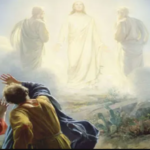Re: Is Jesus the Creator God?
Kingdom Interlinear and John 1:1
It is very interesting to see how the Jehovah’s Witnesses Greek-English Interlinear translation compares with the NWT and with more accurate translations. One Jehovah’s Witness said that their translation comes from an interlinear translation of the Westcott and Hort text and that the NWT is a good translation of it. But let’s check into the two primary interlinear translations appealed to by Jehovah’s Witnesses: the Kingdom Interlinear and the Emphatic Diaglott.
The Kingdom Interlinear8 says:

Look carefully at John 1:1. The Interlinear doesn’t translate Theos (θεος) as “a god,” which is an unjustifiable change in the NWT (to the right of the interlinear above). Strangely the interlinear does not capitalize God the second time it occurs, though it does the first.
One possible reason they tried distinguishing this particular word for God is due to the spellings of Theos (God) in this passage (θεον, θεος) is due to variant endings. Another variant ending is commonly θεου.
In one case, all three variants for God are in one passage and translated as God:
who opposes and exalts himself above all that is called God (θεον) or that is worshiped, so that he sits as God (θεου) in the temple of God (θεον), showing himself that he is God (θεος).
There is really no obvious reason for the change to “a god” or a lower case “god” by the NWT or Kingdom Interlinear.
Emphatic Diaglott and John 1:1–3
The next interlinear to be checked was the Diaglott.9 It translates John 1:1–3 as:

The interlinear this time incorrectly states that theos is “a god”, but the side translation disagrees and says the Logos was God, instead of “a god.” So again, there are mismatches that make no sense.
The Context of the Passage
Interestingly, in defending their translation of John 1:1, Jehovah’s Witnesses say:
Trying to appeal to context, the Jehovah’s Witnesses quote part of John 1:18 and John 1:14 while ignoring the teaching of verse 3 which shows Jesus made all things—no exceptions! We have already shown how Jesus can be with God and be God—it is through the concept of the Trinity.
Regardless, the context of the chapter should not be neglected. John 1:18 is referring to God the Father as the one no one has seen. Thus, in keeping with the context, we can interpret John 1:18 this way: No one has seen God the Father at any time; the only-begotten God, Jesus—He has revealed the Father. Anytime anyone has ever seen God, he has seen the Logos, the Son, since the Son is the Word—the revealer.
Expositor Dr. John Gill explains the reference to God:
So we understand that Jesus reveals God and exists as God at the same time. There is not a contradiction between John 1:1 and John 1:18. In fact, they are amazingly consistent!
Islamic Appeal to the NWT
Muslims also deny the deity of Christ, so John 1:1–3 is also a problem to Islam if taken as written. Muslim apologists have appealed to the NWT in an effort to reduce the deity of Jesus Christ:
Christian apologists have responded:
But this lets us know how influential the Jehovah’s Witnesses and the NWT are. The NWT is being used in Islam to take people away from Jesus Christ.

















